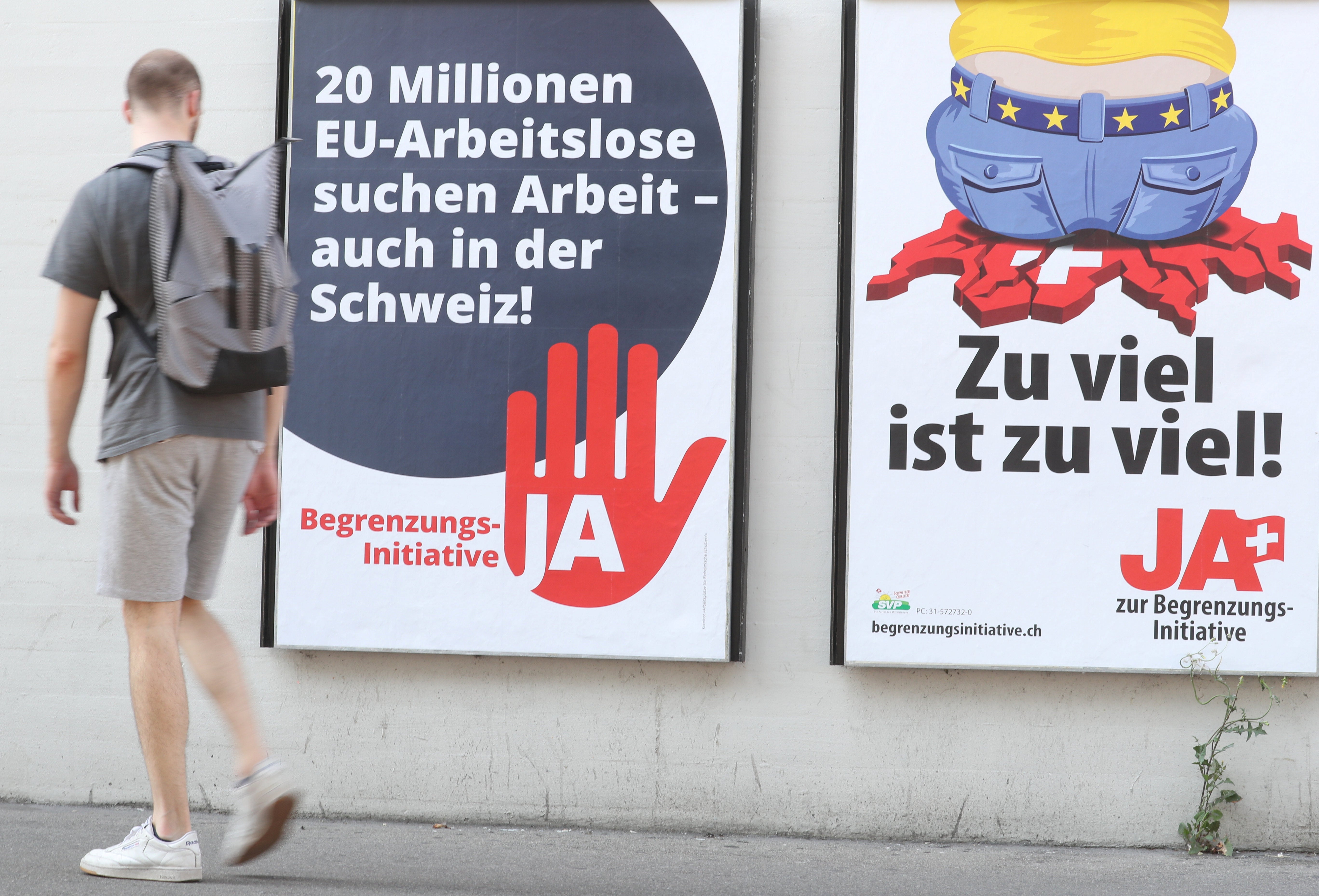Swexit? Switzerland set to vote on scrapping freedom of movement with EU
Bitter campaign echoing Brexit referendum sees ruling, right-wing party claim migrants ‘change our culture’

Your support helps us to tell the story
From reproductive rights to climate change to Big Tech, The Independent is on the ground when the story is developing. Whether it's investigating the financials of Elon Musk's pro-Trump PAC or producing our latest documentary, 'The A Word', which shines a light on the American women fighting for reproductive rights, we know how important it is to parse out the facts from the messaging.
At such a critical moment in US history, we need reporters on the ground. Your donation allows us to keep sending journalists to speak to both sides of the story.
The Independent is trusted by Americans across the entire political spectrum. And unlike many other quality news outlets, we choose not to lock Americans out of our reporting and analysis with paywalls. We believe quality journalism should be available to everyone, paid for by those who can afford it.
Your support makes all the difference.Voters in Switzerland will decide on Sunday on whether to end the country’s agreement with the EU on freedom of movement, concluding a bitter campaign reminiscent of the Brexit referendum.
The ruling, right-wing Swiss People’s Party (SVP) called the referendum, arguing it was time for Swiss citizens to get preferential access to jobs and benefits.
The anti-immigration SVP has campaigned to scrap the free movement of people with EU countries so the government can impose strict limits on the number of foreign nationals coming in to work.
A “yes” vote could transform the country’s ties to the 27-nation bloc and brining about sweeping changes to Swiss society.
Roughly 1.4 million EU citizens live in the country of about 8.2 million. Some 330,000 workers from neighbouring EU countries come across the border to work, many of them health care workers doing vital working during the coronavirus pandemic.
Opponents of the measure – almost every other party on both left and right – have argued Switzerland should not invite huge economic disruption in the midst of the pandemic.
The latest polls suggest the “no” campaign is heading for victory. The most recent survey by gfs.bern agency found that more than 60 per cent were against it, some 35 per cent backed it and the rest were undecided.
Yves Nidegger, a leader SVP politician, played down the potential negative impacts of a “yes” vote. Similar to some of the rhetoric used by the Leave campaign in the UK, he suggested it would straightforward for Switzerland to reorganises its “friendship” with the EU.
“It’s not going to affect our economy ... We create jobs and migrant workers come to take those jobs,” he said. “What we just want is to be able to select, again, who we want and who we do not want, and also give priority jobs to our population.”
The SVP’s anti-immigration campaign has been unashamedly hostile. “Migrants change our culture,” its website states. “Public squares, trains and streets become less safe. In addition, practically half of all welfare recipients are foreigners.”
Michel Matter, of the Liberal Green party, insisted Switzerland shouldn’t risk ties with its main trading partner. He pointed out that because so many agreements are linked, if the one on freedom of movement collapses so would others on trade and agriculture.
“We are in a crisis period. We should not add crisis to crisis,” he said.
Switzerland is not part of the EU, but belongs to the Schengen passport-free zone. Its intricate relationship with the bloc, developed over decades, is governed by several different accords on issues ranging from agriculture to immigration.
The Swiss have the right to live and work in the bloc, and vice-versa for EU citizens living and working in Switzerland.
Rene Schwok, a political analyst at the University of Geneva, said the Swiss could have much lose by antagonising the EU. “It’s clear that, like Britain is learning, the European Union is much stronger than Switzerland. So if there are new negotiations, it won’t be in Switzerland’s interest.”
Voters have been asked whether they want the Swiss authorities to negotiate the end of their freedom of movement accord with the EU within 12 months.
If there’s no new agreement within 12 months, then the Swiss could withdraw unilaterally from the existing accord and ban any future freedom of movement deals.
In a similar referendum in 2014, the Swiss narrowly voted in favour of limiting access of EU citizens to live and work in Switzerland, but parliament did not apply any significant changes — largely out of fear of the hefty impact on the economy.
The SVP, angry over the perceived betrayal, led a campaign to get the issue back on the ballot again this year.
The freedom-of-movement measure is being considered alongside a series of other votes on paternity leave, tax-breaks for child care and the right to hunt wolves to keep their population down.


Join our commenting forum
Join thought-provoking conversations, follow other Independent readers and see their replies
Comments